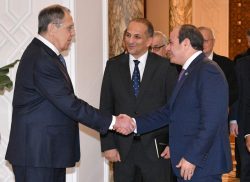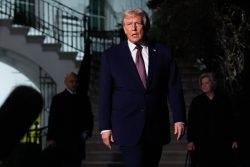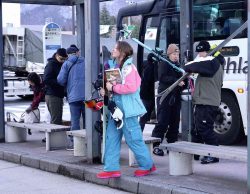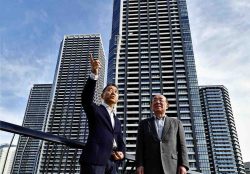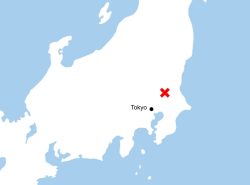Armed Men Storm An Ecuador TV Studio during a Live Broadcast as Attacks in the Country Escalate
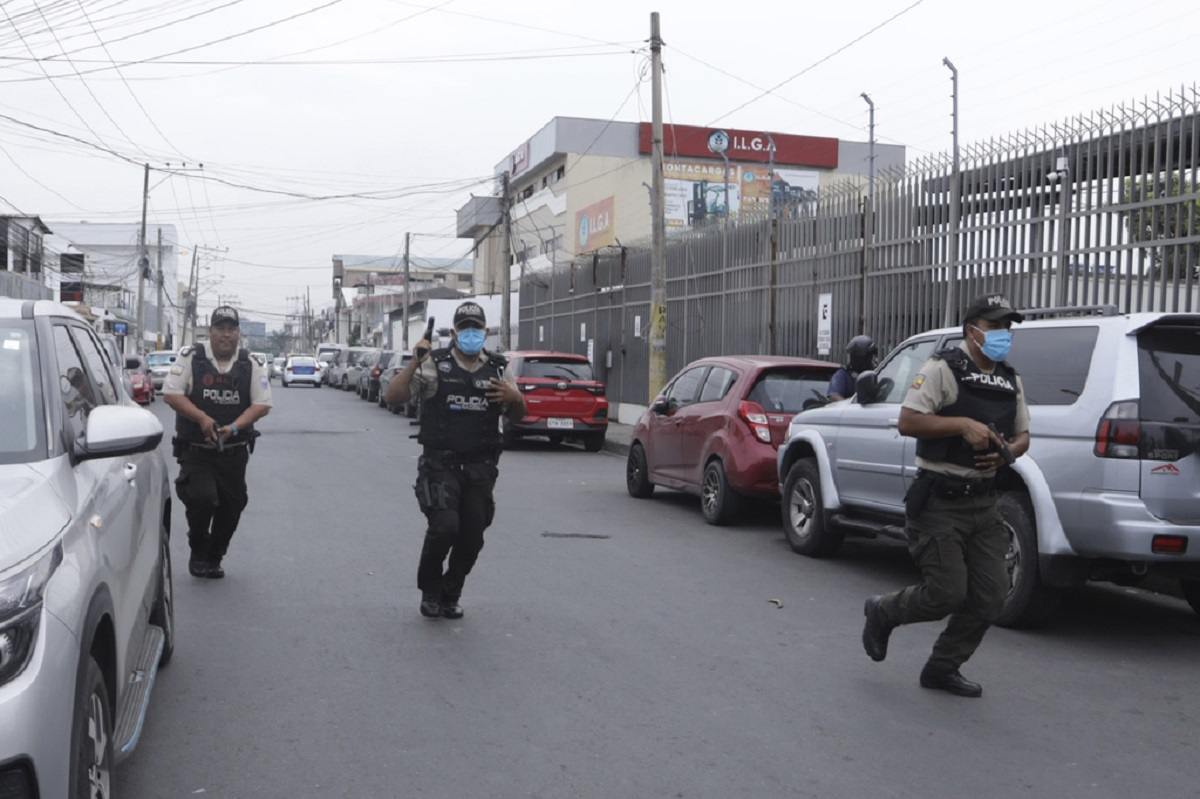
Police respond to an attack at the TC Television network, a public television channel in Guayaquil, Ecuador, Tuesday. Masked men broke onto the set waving guns and explosives during a live broadcast Tuesday.
8:17 JST, January 10, 2024
GUAYAQUIL, Ecuador (AP) — Masked men broke onto the set of a public television channel in Ecuador waving guns and explosives during a live broadcast on Tuesday, and the president issued a decree declaring that the South American country had entered an “internal armed conflict.”
The men armed with pistols and what looked like sticks of dynamite entered the set of the TC Television network in the port city of Guayaquil during a news program that was airing live in thousands of homes across the nation and shouted that they had bombs. Noises similar to gunshots could be heard in the background. It was not immediately clear if any station personnel were injured.
Alina Manrique, the head of news for TC Television, said she was in the control room, across from the studio, when the group of masked men burst into the building. One of the men pointed a gun at her head and told her to get on the floor, Manrique said.
The incident was aired live, although the station’s signal was cut off after about 15 minutes. Manrique said some of the assailants ran from the studio and tried to hide elsewhere in the building when they realized they were surrounded by police.
I am still in shock Manrique told The Associated Press in a phone interview. “Everything has collapsed …. All I know is that its time to leave this country and go very far away.”
Ecuador has been rocked by a series of attacks, including the abductions of several police officers, in the wake of a powerful gang leader’s apparent weekend escape from prison. President Daniel Noboa on Monday declared a national state of emergency, a measure that lets authorities suspend people’s rights and mobilize the military in places like prisons.
Shortly after the gunmen stormed the TV station, Noboa issued another decree designating 20 drug trafficking gangs operating in the country as terrorist groups and authorizing Ecuador’s military to “neutralize” these groups within the bounds of international humanitarian law.
Ecuador’s national police chief later announced that authorities had arrested all the masked intruders. Police commander César Zapata told the TV channel Teleamazonas that officers seized the guns and explosives the gunmen had with them. He said 13 people were arrested.
This is an act that should be considered as a terrorist act, Zapata said.
The government has not said how many attacks have taken place since authorities announced that Los Choneros gang leader Adolfo Macías, alias “Fito,” was discovered missing from his cell in a low security prison Sunday. He was scheduled to be transferred to a maximum security facility that day.
Authorities also have not said who is thought to be behind the attacks, which included an explosion near the house of the president of the National Justice Court and the Monday night kidnappings of four police officers, or whether they think the actions were coordinated.
Police said one officer was abducted in the capital, Quito, and three in Quevedo city.
Los Choneros is one of the Ecuadorian gangs that authorities consider responsible for a spike in violence, much of tied to drug trafficking, that reached a new level last year with the assassination of presidential candidate Fernando Villavicencio. The gang has links with Mexico’s Sinaloa cartel, according to authorities.
The whereabouts of Macías are unknown. Prosecutors opened an investigation and charged two guards in connection with his alleged escape, but neither the police, the corrections system, nor the federal government confirmed whether the prisoner fled the facility or might be hiding in it.
In February 2013, he escaped from a maximum security facility but was recaptured weeks later.
Noboa said in a message on Instagram that he wouldn’t stop until he “brings back peace to all Ecuadorians,” and that his government had decided to confront crime. The wave of attacks began a few hours after Noboa’s announcement.
States of emergency were widely used by Noboa’s predecessor, Guillermo Lasso, as a way to confront the wave of violence that has affected the country.
Macías, who was convicted of drug trafficking, murder and organized crime, was serving a 34-year sentence in La Regional prison in the port of Guayaquil.
Experts and authorities have acknowledged that gang members practically rule from inside the prisons, and Macías was believed to have continued controlling his group from within the detention facility.
"News Services" POPULAR ARTICLE
-

American Playwright Jeremy O. Harris Arrested in Japan on Alleged Drug Smuggling
-

Japan’s Nikkei Stock Average as JGB Yields, Yen Rise on Rate-Hike Bets
-

Japan’s Nikkei Stock Average Licks Wounds after Selloff Sparked by BOJ Hike Bets (UPDATE 1)
-

Japanese Bond Yields Zoom, Stocks Slide as Rate Hike Looms
-

Japan’s Nikkei Stock Average Buoyed by Stable Yen; SoftBank’s Slide Caps Gains (UPDATE 1)
JN ACCESS RANKING
-

Keidanren Chairman Yoshinobu Tsutsui Visits Kashiwazaki-Kariwa Nuclear Power Plant; Inspects New Emergency Safety System
-

Imports of Rare Earths from China Facing Delays, May Be Caused by Deterioration of Japan-China Relations
-

University of Tokyo Professor Discusses Japanese Economic Security in Interview Ahead of Forum
-

Japan Pulls out of Vietnam Nuclear Project, Complicating Hanoi’s Power Plans
-

Govt Aims to Expand NISA Program Lineup, Abolish Age Restriction



